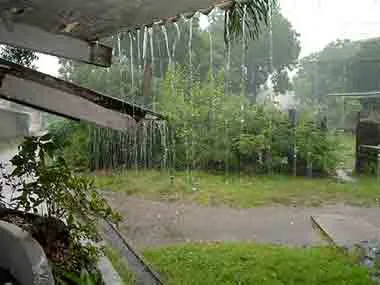As thrilling as it is devastating, the unique Indian Monsoon is the most eagerly awaited of all seasons. As the mercury soars, all eyes look to the sky, seeking the expected but never assured redemption. Based on the principles of Vedic Astrology and Astro Meteorology, Ganesha attempts to predict the arrival of the temperamental phenomenon we call the Monsoon.
By the rules of the old astrology treatise, if in the solar month of Aquarius, the Rohini Constellation (asterism) falls on the 6th Lunar day, there will be poor rain. If it falls on the 7th day, there will be average rain. But if the Rohini Constellation falls on the 8th day, we can expect good rain. The 9th day promises good rain and if Rohini falls on the 10th day, we would be blessed with an excellent downpour.
Chart of Sun’s entry in Ardra Constellation
22nd June, 2009
03 hours 51 min. 05 seconds
The Sun’s entry in Rahu’s first Constellation Ardra is generally taken into account to foretell the rains, as per traditional astrology.
Some schools of thought believe that this fundamental should have been modified because of the Ayanamsha (Footnote 1) factor and moving zodiac (Footnote 2). However, Ganesha finds that the basic rules, written years back, qualify as equally effective and relevant in today’s time.
The Moon’s position in the Taurus Rising Chart for Sun’s entry in Ardra Constellation promises a good start of rains around 22nd June, 2009, but again Saturn, a dry planet, is placed in the 4th House in a fiery sign, so it would be wise to lower our expectations a bit. Uranus in Pisces promises unexpected rainfall, wherein even meteorological calculations go haywire, but there may not be much such instances.
The eastern, southern, and western parts may receive more rain between 22nd June and 16th July, 2009.
Importance of Ingress Charts in weather forecast
The Sun – the source of energy’s ingress in the Cardinal Sign – is a vital factor for weather forecast. As an example, for summer, we will consider the Solar Ingress in Aries. Likewise, for Monsoon, we consider the Solar Ingress in Cancer. Those with a basic knowledge of astrology will know that Cancer is the first watery sign of the Zodiac, hence it’s direct connection with rain. The Chart for Sun’s Ingress in Cancer during the current year is as follows:
Solar Ingress in Cancer
16th July, 2009
15 hours 07 min. 48 sec.
Delhi, India
Your free Janam Kundali analysis can deliver important messages to you about your strengths, weaknesses, relationships, career, business, wealth and natal promise that you are born with!
Solar Ingress in Cancer and rains
The country’s weather is to be checked from the 4th House of the chart, but the Ascendant is equally vital in a horoscope. Ganesha observes that the rising sign at the time of the Solar Ingress in Cancer is Scorpio. It is to be noted that Scorpio is a fixed and watery sign, ruled by Mars. Jupiter, a natural benefic, is retrograde and posited in Aquarius with Neptune.
The sign ruling the 4th House is Aquarius – the sign of the ‘water bearer’. In a horoscope, the 4th House rules roots or the lowest nether regions (deepest abyss of earth). Saturn, a dry planet, aspects its own sign which falls in the 4th House.
These factors indicate that this time, despite average rains, more water will be collected or stored in the nether regions. This doesn’t happen if rains are heavy during the day time because the water evaporates. As there are more planets of larger cycles in the dark half of the chart (7th House to 2nd House), Ganesha feels that there will be considerable rainfall in the late hours of the night and at dawn (third and last pahar of the night).
Eastern and Southern India will receive more rain, predicts Ganesha based on planetary triplicity and the elements. Jupiter, which has a tendency to raise the temperature, is retrograde in the 4th House of the Solar Ingress chart, which may mean that during this monsoon, we may feel suffocated in a closed environment with poor ventilation.
Good luck to all of us, and may Lord Ganesha grant beneficent rains, especially to the farmers.
Footnote 1
Ayanamsha
Precession of the Equinoxes or Ayanamsha, the factor that decides the increasing gap between two zodiacs – sidereal and tropical. Ayanamsha changes at the rate of 50 Vikala (seconds) per year.
Footnote 2
Moving Zodiac
Indian Astrology method is based on the fixed zodiac, and it is called a sidereal system, whereas in the Western world, they follow a system called the Tropical Zodiac System. Ganesha explains this in detail. Because of the precession of the equinox, the reference point of 0 degree Aries or Vernal Equinox doesn’t maintain its position with respect to the fixed star and keeps moving along the Ecliptic. So, some two thousand years ago, the Sun was pointing towards a particular star at the time of vernal equinox or at the time of Sun’s ingress in Aries, but now this point has shifted to the beginning of Taurus.
To Get Your Personalised Solutions! Talk To The Best Astrologer Now.
With Ganesha’s Grace,
Dharmeshh Joshi,
www.GaneshaSpeaks.com
You may like these articles to read:
Find out your zodiac sign and know interesting things.
Read what daily horoscope says about you.
Complete and detailed vastu guide by experts.
Get today’s tithi, nakshatra and yog from Panchag Calender.
Hindu festival calendar – Including dates, muhurat and other things.
Check Compatibility With Your Partner
